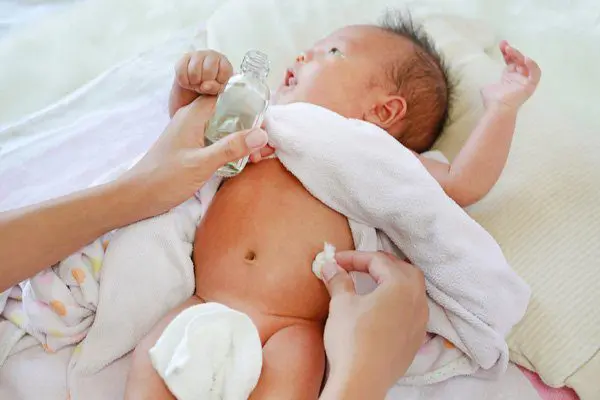Babies with gas are nothing unusual. In fact, it’s perfectly natural. While three to six weeks tend to be when babies get gassiest, it can go on for much longer than that. If we’re honest, even into adulthood!
Whether you find it hilarious or horribly embarrassing when your baby, often quite loudly, lets out all their pent-up gas, it can also be worrying when she doesn’t and the gas gets trapped. Particularly if she’s crying or looks in pain or distress.
To help put your mind at rest, read on to learn what causes gas, how to spot it, and the best methods of prevention and cure.
Why do babies get gas?
There are two main sources of gas in newborns. The first is simply a natural part of digestion. When the large intestine breaks down food sugars, it produces bubbles of gas. And because your baby is feeding around the clock, that means a lot of digesting, and a lot of gas. The second source is baby sucking in an excess amount of air, typically when feeding or crying.
In both cases, that gas comes out naturally (typically as burps or wind), but sometimes it gets trapped. This can cause bloating and, sometimes, discomfort. But it’s important to remember that, more often than not, gas is painless and harmless. Even if your baby is crying, it’s as likely that she’s simply disconcerted by the strange, new sensations she’s experiencing, as it is that she’s in pain or distress.
Is it gas (or something else)?
If your baby seems distressed and has a bloated tummy or is pulling up his legs, that may well be a sign of trapped gas.
While many parents, quite understandably, get concerned when they see those symptoms, they are rarely indicative of a more serious underlying condition. Of course, if gas-relieving techniques or pooping don’t ease baby’s discomfort, if he cries for several hours, or if you’re otherwise concerned, contact your pediatrician.
How to relieve baby’s gas.
If your baby is gassy, there are several simple things you can do to help that gas work its way out.
The first thing to say, though, is that a gassy baby shouldn’t mean you immediately need to reach for the medication. While some mothers have found those medications to help, evidence of their effectiveness is, at best, mixed. There are easier, cheaper and more natural solutions that are likely to work just as well.
Take these five, for example:
Bike it out. Lay baby on his back on a flat surface. Take his legs in each hand, and lift back and forth, as though he’s pedaling a bicycle. The movement should help to work out the gas bubbles in no time.
Squat it out. Sitting baby on your lap facing you and lifting up her legs can put gentle pressure on help abdomen and work out the gas. Some find that lifting their knees so baby’s back is against their thighs and her feet against their chest works even better.
Hold it out. Hold baby stomach down on your forearm, with his legs either side, and his head resting in your palm or the crook of your arm. This is sometimes known as the “gas hold” or “colic carry”
Rub it out. Lie baby on a flat surface. With both hands, gently massage her tummy in small clockwise circular motions just below the ribcage. This can help to break up the bubbles and help them pass through.
Soak it out. Sitting your baby in a warm water bath not only helps the gas bubbles dissipate, it can also help him relax.
How to help prevent gas.
They say prevention is better than cure. It’s certainly true that there are several easy steps to help reduce how often your baby gets gas.
Burping at feeding time is a familiar routine. But if you only do so after a feed, there’s a risk that quite a lot of gas might already have become trapped. All the guzzling (and sometimes crying) that goes on at feed-time means that baby is probably taking in lots of excess air. Instead of waiting until the feed is done, try burping midway through as well, during one of the natural pauses in the feed. Although some babies will need more frequent mid-feed burping, for most once is enough. Any more than that, and you may just be unnecessarily extending feeding time, meaning an unhappy, hungry baby and, most likely, even more sucking in of air.
Typically, bottle-fed babies tend to suffer from gas more than those who are breastfed. That’s because sucking on the bottle teat can suck in a lot of excess air too. To help reduce this, hold the bottle at an angle so the teat fills completely with milk. And if you’re using powdered formula, let it settle after mixing. The mixing process can mean lots of bubbles getting into the formula. This can again add to the amount of air baby takes in.
Even for nursing moms, though, there are ways to help improve the seal between baby’s mouth and your nipple to stop him sucking in air. Some, for example, recommend applying a thin layer of petroleum jelly or olive oil around your areola before feeding.
Diet can also make a difference. Mainly baby’s diet, but also – if she’s breastfeeding – sometimes mom’s too. Some babies can find certain formulas hard to digest, for example. And for most moving to solid foods is also a big (and often gas-inducing) change.
Green vegetables, beans, and fruits, in particular, can cause more gas. High-sugar fruit purees – much as kids love them – are a frequent culprit. But, unless you discover an allergy, it’s best not to cut out whole food groups. Fruit and vegetables contain important nutrients, crucially, fiber. Generally, a wide, mixed diet will not only help baby develop best, but it’ll also make mealtimes more interesting.
Perhaps the simplest method of all, however? Just carrying baby around throughout the day. The gentle jiggling will help bubbles continuously work their way through her system, reducing gas build up.



